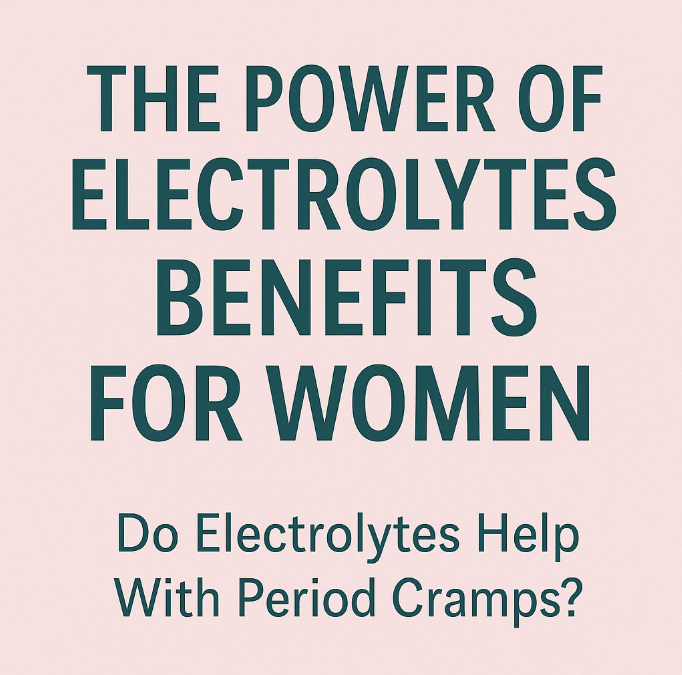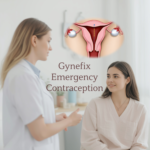What Are Electrolytes and Why Do They Matter?
Electrolytes help regulate:
– Hydration levels
– Muscle contractions
– Nerve function
– pH balance
– Blood pressure
When your electrolyte levels are imbalanced — often due to dehydration, poor diet, illness, or hormonal shifts — symptoms can range from fatigue and headaches to muscle cramps and mood swings.
According to the NHS, dehydration and electrolyte imbalance can severely impact wellbeing, especially during illness or exercise. Women are particularly susceptible to these imbalances due to menstruation and the effects of oestrogen and progesterone on fluid retention and loss (NHS, 2023).
Unique Benefits of Electrolytes for Women
1. Support During Menstruation
During your menstrual cycle, hormonal changes can affect how your body retains fluids and uses minerals. For many women, this leads to bloating, fatigue, and muscle cramping. Electrolytes like magnesium and potassium help relax the muscles and regulate nerve signals, potentially easing cramps and improving mood.
2. Pregnancy and Breastfeeding
Pregnant and breastfeeding women require higher levels of certain electrolytes, particularly calcium, sodium, and magnesium, to support fetal development, milk production, and maternal blood volume. Maintaining proper hydration and mineral balance is critical during these stages.
3. Menopause
Menopause can bring night sweats, muscle stiffness, fatigue, and hot flashes — all of which may be intensified by dehydration and poor electrolyte balance. Adequate intake of electrolytes, especially magnesium, can support better sleep, reduce hot flashes, and improve overall vitality.
Do Electrolytes Help With Period Cramps?
Yes, they can. Period cramps are caused by the contraction of the uterine muscles, triggered by hormone-like substances called prostaglandins. Magnesium, in particular, has been shown to reduce prostaglandin levels and help muscles relax, potentially reducing the severity of cramps (Office on Women’s Health, USA).
A study by the NIH also supports magnesium supplementation for reducing menstrual pain. Potassium and calcium play supporting roles by easing muscle tension and promoting fluid balance.
Drinking an electrolyte-rich drink — especially one low in sugar and high in magnesium and potassium — can ease the symptoms of period cramps when combined with hydration, light movement, and stress management.
Best Ways to Boost Electrolytes Naturally
– Coconut water: Naturally rich in potassium and magnesium
– Leafy greens: Spinach and kale offer magnesium and calcium
– Bananas and avocados: High in potassium
– Nuts and seeds: Great sources of magnesium
– Natural electrolyte powders: Especially during hot weather, exercise, or periods
Avoid highly processed sports drinks loaded with sugar and artificial additives. Look for clean-label products or make your own with lemon, sea salt, and a teaspoon of honey in water.
Signs You May Have an Electrolyte Imbalance
– Fatigue or dizziness
– Muscle cramps or spasms
– Bloating or water retention
– Headaches or brain fog
– Increased irritability, especially around your period
If these symptoms are recurring, it might be time to check in with a gynaecologist or holistic health practitioner.
Final Thoughts: Hydration with Purpose
Electrolytes are more than just a sports recovery trend. They are foundational to women’s health at every stage of life. Whether you’re navigating menstrual cycles, pregnancy, menopause, or simply a high-stress lifestyle, keeping your electrolyte levels balanced can significantly boost your energy, reduce discomfort, and support hormone balance.
At Holistic Gynaecology Clinic London, we believe that healing begins with the small, daily choices you make. Start with hydration — but make it mineral-rich and purposeful.
Bibliography
– NHS. (2023). Dehydration. Retrieved from https://www.nhs.uk/conditions/dehydration/
– Office on Women’s Health, U.S. Department of Health and Human Services. (2021). Menstrual Cramps. Retrieved from https://www.womenshealth.gov/menstrual-cycle/menstrual-cramps
– National Institutes of Health (NIH). (2020). Magnesium Fact Sheet for Health Professionals. Retrieved from https://ods.od.nih.gov/factsheets/Magnesium-HealthProfessional/
– Harvard School of Public Health. (2021). The Nutrition Source: Electrolytes. Retrieved from https://www.hsph.harvard.edu/nutritionsource/electrolytes/





